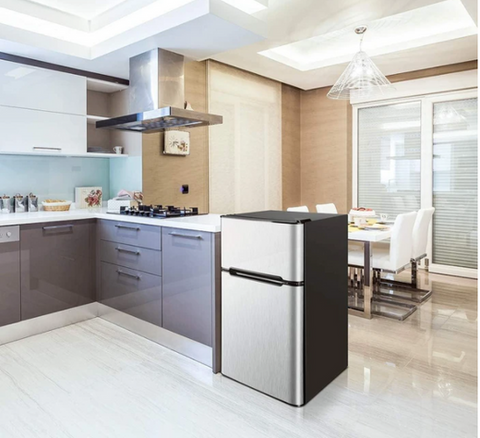Fridges and freezers already take a heavy toll on our electricity bills, all the more reason to use them optimally to consume less energy.

Since it arrived in 1913, the refrigerator has become an indispensable part of our kitchens. Thanks to this device, we can keep food for longer; which is excellent in the context of food waste. But it is also one of the biggest consumers of electricity in the house.
That's why we give you 5 tips for saving money with your refrigerator, and it's not complicated. A few simple steps that you will see will save you money throughout the year. Result in a lighter electricity bill, always good to take no?

Tip 1: Make sure you have an energy-efficient model at home
Refrigerators have become much more economical in recent years. If you still have an older model, it might be worth replacing it, even if the old one is not yet broken. Do you have an American model in the kitchen? If so, quickly swap out your flashy fridge for a "normal" fridge-freezer combination, as they consume 40% more energy. A fridge-freezer combination is generally more economical than a separate fridge and freezer.
Tip 2: Check if the refrigerator is in the right place
Is your refrigerator exposed to the sun next to the window or next to the heater? Not practical! The warmer the environment, the higher the energy consumption of your refrigerator. Is your refrigerator already in the right place? Then check if it is at least 10 centimeters from the wall. If there is too little space between the refrigerator and the wall, the heat cannot dissipate properly. This means the device has to work harder to cool the content, so you use more power.
The more your refrigerator has to cool, the more energy it uses. It makes sense, doesn't it? So keep this in mind when using a refrigerator.
Tip 3: Clean the fridge (and freezer) well inside and out
Dust on the grill or condenser reduces the heat output of the refrigerator. In addition, it can create a fire hazard. If you have a freestanding refrigerator, it's a good idea to dust it off once a year. In addition, it is important that the refrigerator is also clean inside; in particular, the rubber edges of the door work best when clean. Also, keep your freezer free of ice as much as possible. Otherwise, it will consume more energy. In winter, you temporarily put the contents of the refrigerator outside; in summer, you can organize a defrost relay for your freezer with your neighbors. It can be fun too!
To read also: Each fridge problem has its solution!
Tip 4: use your fridge wisely
The more your refrigerator or freezer has to cool, the more energy it uses. Pretty logical, right? Keep this in mind when using the refrigerator. This means that you must let leftover food cool before putting it in the refrigerator, that you defrost the products from the freezer in the refrigerator first, and never leave the door open unnecessarily for a long time (like the lady in the photo above. above this article).
To read also Fridge: the 4 most frequent breakdowns
Tip 5: fill your fridge
Is your refrigerator never completely full? Completely fill empty spots with bottled water. This is especially true when you can leave the bottles on for longer. If you fill the empty spaces in the fridge (and freezer!) With water, the fridge doesn't have to work as hard when the door is open. Once the refrigerator is opened, the hot air must be cooled. The more products there are in your refrigerator, the less room there is for hot air after opening it. Is your refrigerator always full?
Tip 6: Turn off your fridge when you are outside for a longer time
When you are absent, is it good to turn off your refrigerator? The answer is yes, in short.
Importance Notice: always remember to rest your fridge every time you have moved your refrigerator for a long time.
Do you like this blog post? Or do you have a suggestion? Please comment below and share with your friend.

